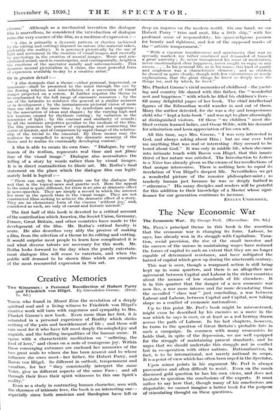Creative Memories
THOSE who found in Mount Zion the revelation of a deeply spiritual soul and a living witness to Friedrich von H(igel's creative work will turn with eagerness and sympathy to Mrs. Plunket Greene's new book. Even more than her first, it is saturated in a personal experience of Reality which shirks nothing of the pain and bewilderment of life ; and those will care most for it who have felt most deeply the mingled joy and anguish, and the baffling inequalities of the human scene. It opens with a characteristic meditation on " suffering, the food of love," and closes on a note of courageous joy. Within these converging extremes are enclosed her memories of the two great souls to whom she has been nearest and to whose influence she owes most—her father, Sir Hubert Parry, and Baron von Hiigel. So different in outlook, temperament and vocation, for her " they consistently interpret the same Voice, give us different aspects of the same Face ; and all through their lives their spirit witnesses to this one Spirit's reality."
Even as a study in contrasting human character, seen with the clearness of intimate love, the book is an interesting one— especially since both musician and theologian have left so
deep an impress on the modem world. On one hand, we see Hubert Parry " trim and neat, like a little ship," with his profound sense of responsibility, his quasi-religious passion for beauty and rightness, and few of the supposed marks of the artistic temperament."
" With a vigorous impulsiveness and spontaneity that was an specially marked, my father combined and dynamited of himself a great austerity ; he never transgressed his sense of moderation, never emotionalized clear happiness, never sought to enjoy in any . In his personal life, as in his music, this kind of purity and singleness was a characteristic element ; and as children he showed us quite clearly, though with few exhortations or wordy explanations, that the great things he loved so deeply were oho things for, and by which, he lived."
Mrs. Plunket Greene's vivid memories of childhood —the yacht- ing and country life shared with this father, the " wonderful zest and happiness " with which he filled his children's lives— fill many delightful pages of her book. The chief intellectual figures of the Edwardian world wander in and out of them. Many the author detested, for she was a shy and tempestuous child who " kept a hate-book " and was apt to glare alarmingly at distinguished visitors. Of these " we children " most dis- liked certain learned ladies, and Oscar Wilde, with his demand for admiration and keen appreciation of his own wit.
All this time, says Mrs. Greene, " I was very interested in God, and always asking about Him ; but no one ever told me anything that was real or interesting—they seemed to be bored about God." It was only in middle life, when shecame into intimate touch with Baron von Hiigel, that this innate thirst of her nature was satisfied. The Introduction to Letters to a Niece has already given us the cream of her recollections of that unique intercourse. There is nothing here to equal its revelation of Von }lagers deepest life. Nevertheless we get a wonderful picture of the massive philosopher-saint ; so tenderly human just because he was so deeply bathed in " otherness." His many disciples and readers will be grateful for this addition to their knowledge of a Master whose signi- ficance for our generation continues to increase.
EVELYN UNDERHILL.


























































 Previous page
Previous page